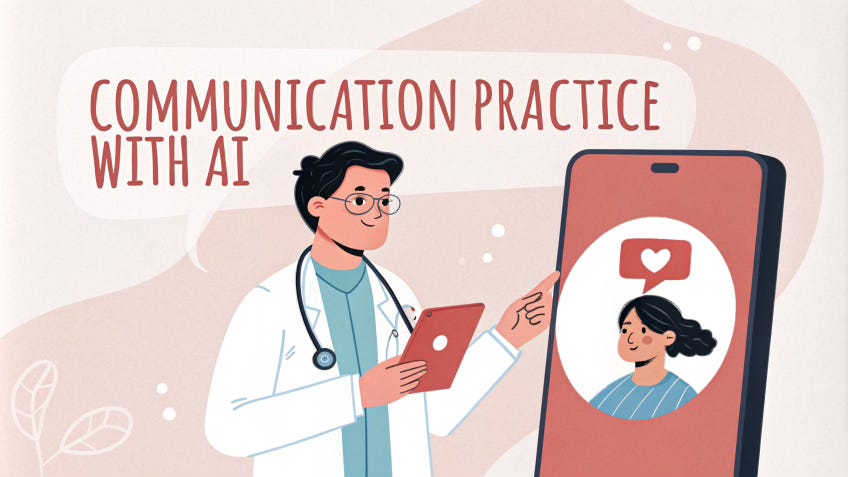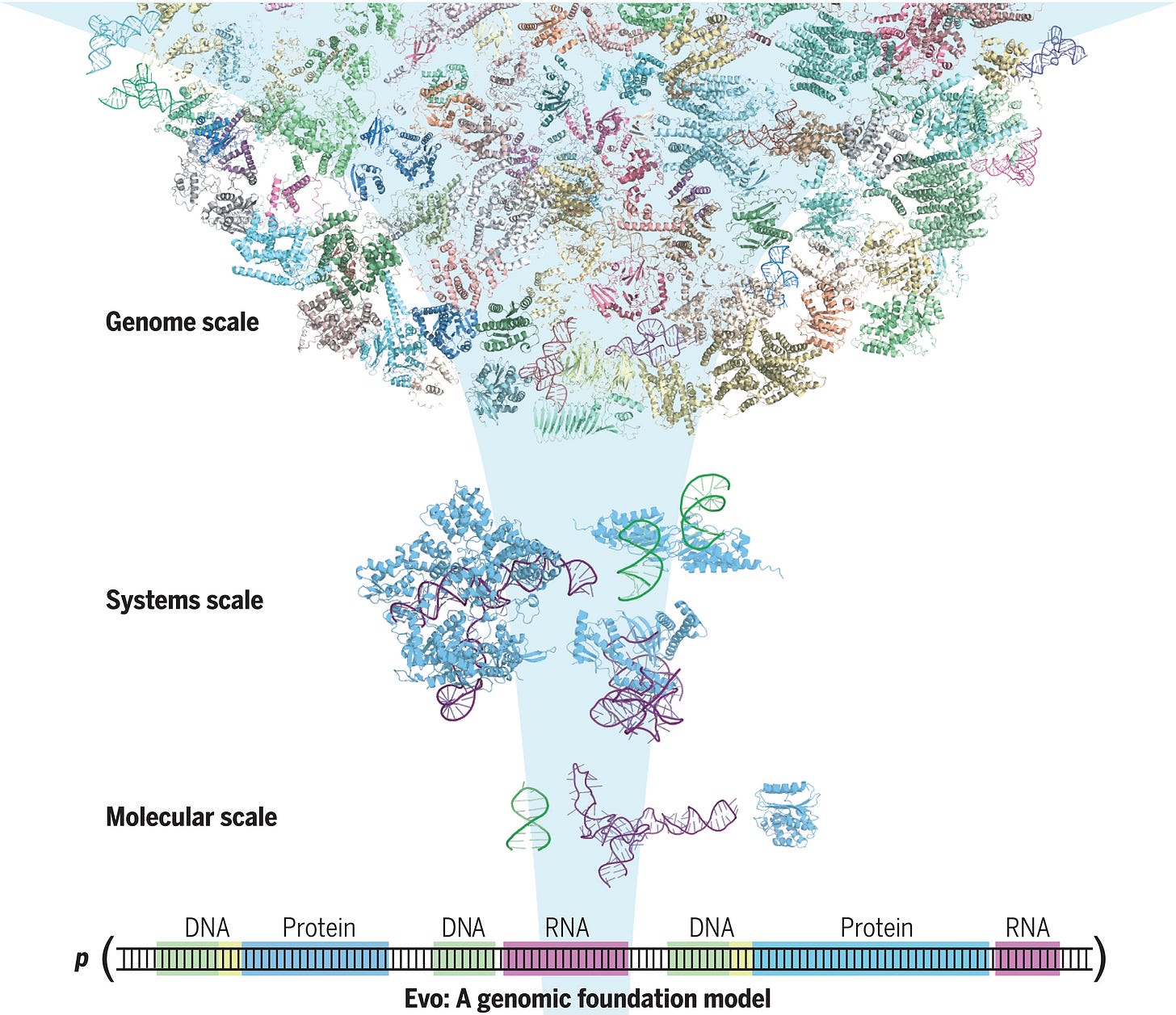🩺 The Pulse: Can AI Really Outsmart Doctors?
Plus: how the "ChatGPT for DNA" may alter the future of life on this planet.
1. Triage – Your Weekly Rundown
Hi Pulse Readers - this week, we’re diving into:
the heated debate over a study claiming AI outperforms doctors in diagnostic reasoning,
a groundbreaking “ChatGPT for DNA” unlocking new possibilities in genomics,
and we show you how AI-powered voice simulations can help clinicians hone their communication skills.
2. Case Study – Your Weekly Practical
Image Source: generated with Recraft.ai
Practising Communication Skills with AI
Effective communication is a vital skill for healthcare professionals. Traditional training methods, such as role-playing and simulations, require significant time and resources.
Approach: AI tools like ChatGPT with voice mode offer an innovative solution for communication practice by simulating realistic patient interactions. Using simple prompts, healthcare professionals can engage in virtual role-play to refine their bedside manner and communication techniques.
Watch a video tutorial here, and/or follow the step by step below.
How to Use AI for Communication Practice:
Access Voice Mode: Open advanced voice mode in an AI tool like ChatGPT (premium feature - available as a mobile app or web application).
Set the Scenario: Begin with a clear prompt, such as: "Act as a patient. I am a physician practicing to deliver bad news regarding a serious diagnosis. Respond as a concerned patient."
Conduct the Simulation: Engage in the conversation, practising your communication skills. For example, deliver test results with empathy and offer supportive follow-up questions, such as: "How are you feeling about this news?"
Request Feedback: Ask the AI to provide feedback on your tone, clarity, or approach to ensure you improve over time.
Outcomes: Practising communication with AI allows clinicians to simulate a variety of scenarios, from delivering bad news to de-escalating potentially aggressive situations, in a low-pressure environment. This approach is flexible, scalable, and accessible, helping professionals build confidence and refine critical soft skills.
3. The Pulse - Your weekly Update
AI Outperforms Doctors? A Closer Look at a Controversial Study
Image Source: Dr Terence Tan LinkedIn via AI Health Uncut
A recent study published in JAMA claimed that a large language model (LLM) outperformed clinicians in diagnostic reasoning tasks, which was then later sensationalised in a NYT article and amplified widely, including by Elon Musk. Many experts have raised concerns about the study's validity due to its questionable methodology and small sample size, as explained in this excellent deep dive by Sergei Polevikov.
The Study's Claim: The LLM achieved a 92% accuracy in diagnostic reasoning across six hand-picked medical cases, compared to 74% for physicians and 76% for physicians using the LLM as a tool.
The Issues: Critics argue the study’s reliance on only six medical case histories from an original dataset of 105 undermines its credibility. Hand-picking curated cases and excluding 94% of the sample without transparency raises questions about bias and real-world applicability.
Real-World Implications: While the study showcases the potential of AI in assisting clinicians, its limitations—lack of training for physicians on using the LLM, reliance on structured vignettes rather than real patient interactions, and minimal sample size—make its findings difficult to generalize.
Implications: This study highlights the need for rigorous standards in AI research, particularly in medicine. Oversimplified claims, amplified by media outlets, risk creating unrealistic expectations for AI's capabilities in healthcare, as well as frustrations in the medical workforce.
Cracking the Code: Evo’s Role in the Future of Genomics
Image Source: Science.Org
Scientists at the Arc Institute in Palo Alto and the Stanford Department of Bioengineering have unveiled Evo, a revolutionary AI model dubbed “ChatGPT for DNA.” Trained on 2.7 million microbial genomes, Evo excels at both interpreting and generating genetic sequences, opening new frontiers in genome research and engineering.
What It Does: Evo simultaneously analyzes DNA, RNA, and protein sequences, enabling zero-shot function prediction and generating realistic genome-length sequences exceeding 1 million base pairs. It has already designed functional genetic editing tools and accurately predicted DNA changes' effects on bacterial fitness.
Safety: Researchers intentionally excluded human-affecting viral genomes from Evo's training dataset to mitigate potential risks.
Applications: Evo could drastically accelerate research, design proteins for drug development, predict disease-causing mutations, and provide unprecedented insights into biological systems.
Implications: Evo’s potential is groundbreaking, but its ability to “write genetic code” with ease raises significant ethical and safety questions. Striking a balance between innovation and responsible use will be crucial as this technology advances.
4. Vitals – Quick Bytes
AI Journaling for Mental Health: AI-powered journaling tools like Mindsera and Rosebud are transforming the journaling experience by providing personalised prompts, emotional insights, and detailed feedback. These tools aim to enhance emotional processing and self-awareness, making journaling more accessible and effective for users coping with stress, grief, or chronic illness. While not a substitute for professional care, AI journaling offers a supplemental tool for maintaining mental well-being.
(popsugar.com)Personalized Stroke Treatment with AI: The TRUSTroke project at Vall d’Hebron Hospital in Spain uses AI to analyse medical records and patient data, providing tailored treatment plans to optimise stroke recovery and prevent complications. (ft.com)
We’d love to hear your thoughts, so joint the conversation by leaving a comment below:
Stay tuned for more insights in next week's edition of The Pulse.
Have a great day & see you next week!
Your Hendrix Health Team





